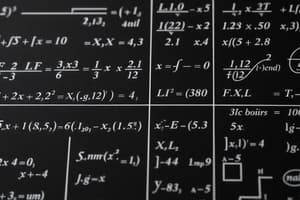Podcast
Questions and Answers
What is the primary focus of engineering mathematics?
What is the primary focus of engineering mathematics?
- Theoretical physics and its applications
- Mathematical methods applied in engineering and industry (correct)
- The study of historical mathematical theories
- Development of new mathematical concepts in pure mathematics
Which mathematical area involves matrices and determinants?
Which mathematical area involves matrices and determinants?
- Complex Numbers and Functions
- Probability and Statistics
- Linear Algebra (correct)
- Calculus
What are Ordinary Differential Equations (ODEs) primarily used for in engineering?
What are Ordinary Differential Equations (ODEs) primarily used for in engineering?
- To create random data samples for simulations
- To analyze historical engineering data
- To model static equilibrium scenarios
- To model dynamic systems such as motion and growth (correct)
What is a primary application of Fourier Series in engineering?
What is a primary application of Fourier Series in engineering?
Which technique is used for resource allocation in engineering?
Which technique is used for resource allocation in engineering?
In signal processing, complex numbers are mainly utilized for which purpose?
In signal processing, complex numbers are mainly utilized for which purpose?
What is an application of numerical methods in engineering?
What is an application of numerical methods in engineering?
Which of the following describes Vector Calculus?
Which of the following describes Vector Calculus?
Flashcards are hidden until you start studying
Study Notes
Overview of Engineering Mathematics
- Definition: A branch of applied mathematics focusing on mathematical methods and techniques used in engineering and industry.
Key Areas
-
Calculus
- Differentiation and integration
- Applications: Rate of change, area under curves, optimization problems
-
Linear Algebra
- Matrices and determinants
- Vector spaces and linear transformations
- Applications: Systems of equations, structural analysis
-
Differential Equations
- Ordinary Differential Equations (ODEs)
- Partial Differential Equations (PDEs)
- Applications: Modeling dynamic systems, heat transfer, fluid flow
-
Complex Numbers and Functions
- Complex arithmetic and polar forms
- Applications: Electrical engineering, signal processing
-
Probability and Statistics
- Basic probability theory and distributions
- Statistical methods and data analysis
- Applications: Quality control, risk assessment
-
Numerical Methods
- Approximation techniques for solving mathematical problems
- Numerical integration and differentiation
- Applications: Computational simulations, optimization problems
Important Concepts
- Transform Methods: Laplace and Fourier transforms for solving differential equations.
- Optimization: Techniques such as linear programming and calculus of variations for resource allocation.
- Vector Calculus: Understanding gradients, divergences, and curls in three-dimensional space.
- Fourier Series: Representing functions as sums of sines and cosines for periodic functions.
Applications in Engineering
- Modeling Physical Systems: Using mathematical formulations to predict behavior in mechanical, electrical, and civil engineering.
- Control Theory: Application of differential equations and transforms to design control systems.
- Signal Processing: Utilization of complex numbers and Fourier analysis to process signals.
Study Tips
- Practice solving real-world engineering problems using mathematical concepts.
- Familiarize yourself with software tools like MATLAB or Python for numerical computations.
- Collaborate with peers for problem-solving and conceptual discussions.
- Utilize visual aids and graphs to understand complex concepts.
Overview of Engineering Mathematics
- Engineering mathematics employs applied mathematics to address challenges in engineering and industry.
Key Areas
-
Calculus
- Involves differentiation and integration, crucial for understanding changes and areas.
- Integral for optimization problems such as maximizing efficiency and minimizing costs.
-
Linear Algebra
- Centers on matrices, determinants, vector spaces, and linear transformations.
- Essential for solving systems of equations prevalent in structural analysis.
-
Differential Equations
- Includes Ordinary Differential Equations (ODEs) and Partial Differential Equations (PDEs).
- Critical for modeling dynamic behaviors like heat transfer and fluid dynamics.
-
Complex Numbers and Functions
- Focuses on complex arithmetic and expressions in polar form.
- Vital in electrical engineering and signal processing applications.
-
Probability and Statistics
- Covers foundational probability theory, distributions, and statistical methods.
- Applied in quality control processes and risk assessment strategies.
-
Numerical Methods
- Offers approximation techniques for complex mathematical problems.
- Encompasses numerical integration and differentiation used in computational simulations.
Important Concepts
-
Transform Methods
- Utilizes Laplace and Fourier transforms to simplify and solve differential equations.
-
Optimization
- Involves linear programming and calculus of variations for effective resource allocation.
-
Vector Calculus
- Entails understanding gradients, divergences, and curls, essential in three-dimensional space analysis.
-
Fourier Series
- Represents periodic functions through sums of sine and cosine functions, facilitating easier analysis.
Applications in Engineering
-
Modeling Physical Systems
- Mathematical formulations predict behaviors in mechanical, electrical, and civil engineering fields.
-
Control Theory
- Implements differential equations and transform methods in designing sophisticated control systems.
-
Signal Processing
- Employs complex numbers and Fourier analysis to enhance signal interpretation and processing efficiency.
Study Tips
- Engage in solving practical engineering problems to reinforce mathematical concepts.
- Gain familiarity with numerical computing tools such as MATLAB or Python for effective problem-solving.
- Collaborate in study groups for diverse perspectives and deeper understanding.
- Use visual aids and graphical representations to clarify and simplify complex mathematical ideas.
Studying That Suits You
Use AI to generate personalized quizzes and flashcards to suit your learning preferences.




